formerly eScholarship Editions


|
|
|
|
Your search for
'Anthropology' in subject
found 300 book(s). | Modify Search | Displaying 81 - 100 of 300 book(s) | |
| 81. |  | Title: Factory daughters: gender, household dynamics, and rural industrialization in Java Author: Wolf, Diane L Published: University of California Press, 1992 Subjects: Gender Studies | Sociology | Southeast Asia | Anthropology Similar Items |
| 82. | 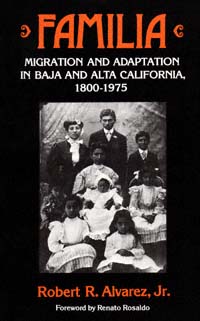 | Title: Familia: migration and adaptation in Baja and Alta California, 1800-1975 Author: Alvarez, Robert R Published: University of California Press, 1987 Subjects: Anthropology | Cultural Anthropology | Demography | Latin American History | Latin American Studies | Postcolonial Studies Publisher's Description: Anthropologists, historians, and sociologists will find here a striking challenge to accepted explanations of the northward movement of migrants from Mexico into the United States. Alvarez investigates the life histories of pioneer migrants and their offspring, finding a human dimension to migration which centers on the family. Spanish, American, and English exploits paved the way for exchange between Baja and Alta California. Alvarez shows how cultural stability actually increased as migrants settled in new locations, bringing their common values and memories with them. [brief] Similar Items |
| 83. | 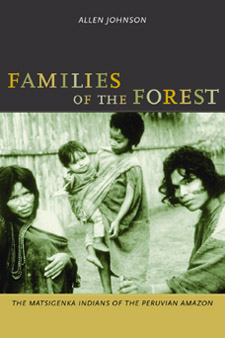 | Title: Families of the forest: the Matsigenka Indians of the Peruvian Amazon Author: Johnson, Allen W Published: University of California Press, 2003 Subjects: Anthropology | Ecology | Latin American Studies Publisher's Description: The idea of a family level society, discussed and disputed by anthropologists for nearly half a century, assumes moving, breathing form in Families of the Forest. According to Allen Johnson's deft ethnography, the Matsigenka people of southeastern Peru cannot be understood or appreciated except as a family level society; the family level of sociocultural integration is for them a lived reality. Under ordinary circumstances, the largest social units are individual households or small extended-family hamlets. In the absence of such "tribal" features as villages, territorial defense and warfare, local or regional leaders, and public ceremonials, these people put a premium on economic self-reliance, control of aggression within intimate family settings, and freedom to believe and act in their own perceived self-interest. Johnson shows how the Matsigenka, whose home is the Amazon rainforest, are able to meet virtually all their material needs with the skills and labor available to the individual household. They try to raise their children to be independent and self-reliant, yet in control of their emotional, impulsive natures, so that they can get along in intimate, cooperative living groups. Their belief that self-centered impulsiveness is dangerous and self-control is fulfilling anchors their moral framework, which is expressed in abundant stories and myths. Although, as Johnson points out, such people are often described in negative terms as lacking in features of social and cultural complexity, he finds their small-community lifestyle efficient, rewarding, and very well adapted to their environment. [brief] Similar Items |
| 84. | 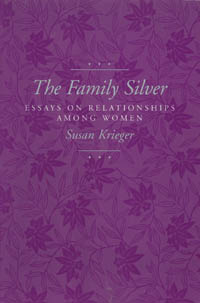 | Title: The family silver: essays on relationships among women Author: Krieger, Susan Published: University of California Press, 1996 Subjects: Gender Studies | Women's Studies | GayLesbian and Bisexual Studies | Sociology | Anthropology Publisher's Description: In an inventive and controversial collection of essays, sociologist Susan Krieger considers the many forms of wealth, both material and emotional, that women pass on to each other. This domestic heritage - the "family silver" - is the keystone for a discussion of mother-daughter relationships, intimate relationships between lesbians, ties between students and feminist teachers, the dilemmas of women in academia as well as in the broader work world, and the importance of female separatism. Drawing on her experiences as a lesbian, a feminist, and a teacher, Krieger presents a stunning critique of higher education. She argues for acknowledging gender in all areas of women's lives and for valuing women's inner realities and outer forms of expression.Krieger has developed a distinctly feminist approach to understanding and scholarship. Her style is self-revelatory, emotional, and at the same time deeply analytical. Her essays pioneer a new method of locating, defining, and honoring female values. The Family Silver includes a thought-provoking discussion of gender roles among women, including the author's experience of being mistaken for a man; an exploration of teaching in a feminist classroom; and a description of the controversy that resulted when the author refused to allow a hostile male student to take one of her courses. Beautifully written, The Family Silver addresses issues of central concern to feminists, postmodernists, and queer theorists and encourages new insights into how gender profoundly affects us all. [brief] Similar Items |
| 85. | 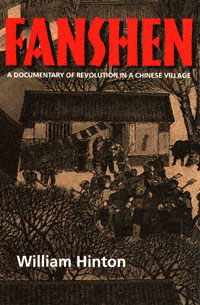 | Title: Fanshen: a documentary of revolution in a Chinese village Author: Hinton, William Published: University of California Press, 1997 Subjects: History | China | Anthropology | Asian History Publisher's Description: More than thirty years after its initial publication, William Hinton's Fanshen continues to be the essential source for those fascinated with China's continual process of rural reform and social change. This edition will appeal to anyone interested in understanding China's complex social processes, . . . [more] Similar Items |
| 86. | 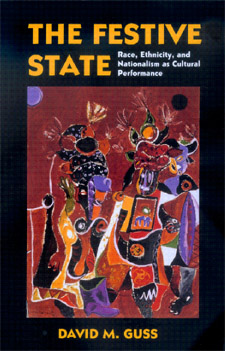 | Title: The festive state: race, ethnicity, and nationalism as cultural performance Author: Guss, David M Published: University of California Press, 2001 Subjects: Anthropology | Latin American Studies | Ethnic Studies | Cultural Anthropology | Sociology | Popular Culture Publisher's Description: If, as David Guss argues, culture is a contested terrain with constantly changing contours, then festivals are its battlegrounds, where people come to fight and dispute in large acts of public display. Festive behavior, long seen by anthropologists and folklorists as the "uniform expression of a collective consciousness, is contentious and often subversive," and The Festive State is an eye-opening guide to its workings. Guss investigates "the ideology of tradition," combining four case studies in a radical multisite ethnography to demonstrate how in each instance concepts of race, ethnicity, history, gender, and nationhood are challenged and redefined. In a narrative as colorful as the events themselves, Guss presents the Afro-Venezuelan celebration of San Juan, the "neo-Indian" Day of the Monkey, the mestizo ritual of Tamunangue, and the cultural policies and products of a British multinational tobacco corporation. All these illustrate the remarkable fluidity of festive behavior as well as its importance in articulating different cultural interests. [brief] Similar Items |
| 87. | 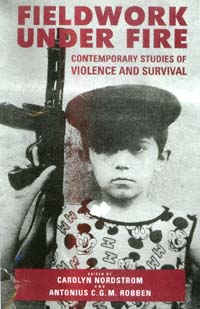 | Title: Fieldwork under fire: contemporary studies of violence and survival Author: Nordstrom, Carolyn 1953- Published: University of California Press, 1996 Subjects: Anthropology | Cultural Anthropology | Social Problems Publisher's Description: Fieldwork Under Fire is a path-breaking collection of essays written by anthropologists who have experienced the unpredictability and trauma of political violence firsthand. These essays combine theoretical, ethnographic, and methodological points of view to illuminate the processes and solutions that characterize life in dangerous places. They describe the first, often harrowing, experience of violence, the personal and professional problems that arise as troubles escalate, and the often surprising creative strategies people use to survive.In "writing violence," the authors give voice to all those affected by the conditions of violence: perpetrators as well as victims, civilians and specialists, black marketeers and heroes, jackals and researchers. Focusing on everyday experiences, these essays bring to light the puzzling contradictions of lives disturbed by violence: the simultaneous existence of laughter and suffering, of fear and hope. By doing so, they challenge the narrow conceptualization that associates violence with death and war, arguing that instead it must be considered a dimension of living. [brief] Similar Items |
| 88. | 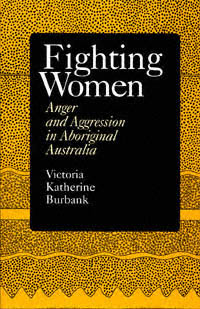 | Title: Fighting women: anger and aggression in Aboriginal Australia Author: Burbank, Victoria Katherine Published: University of California Press, 1994 Subjects: Anthropology | Women's Studies | Psychology Publisher's Description: Fighting is common among contemporary Aboriginal women in Mangrove, Australia - women fight with men and with other women. Victoria Burbank's depiction of these women offers a powerful new perspective that can be applied to domestic violence in Western settings.Noting that Aboriginal women not only talk without shame about their emotions of anger but also express them in acts of aggression and defense, Burbank emphasizes the positive social and cultural implications of women's refusal to be victims. She explores questions of hierarchy and the expression of emotions, as well as women's roles in domestic violence. Human aggression can be experienced and expressed in different ways, she says, and is not necessarily always "wrong." Timely and controversial, Fighting Women will stimulate discussion of aggression and gender relations and will enlarge the debate on the victimization of women and children everywhere. [brief] Similar Items |
| 89. | 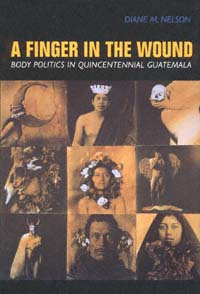 | Title: A finger in the wound: body politics in quincentennial Guatemala Author: Nelson, Diane M 1963- Published: University of California Press, 1999 Subjects: Anthropology | Latin American Studies | Latin American History Publisher's Description: Many Guatemalans speak of Mayan indigenous organizing as "a finger in the wound." Diane Nelson explores the implications of this painfully graphic metaphor in her far-reaching study of the civil war and its aftermath. Why use a body metaphor? What body is wounded, and how does it react to apparent further torture? If this is the condition of the body politic, how do human bodies relate to it - those literally wounded in thirty-five years of war and those locked in the equivocal embrace of sexual conquest, domestic labor, mestizaje , and social change movements?Supported by three and a half years of fieldwork since 1985, Nelson addresses these questions - along with the jokes, ambivalences, and structures of desire that surround them - in both concrete and theoretical terms. She explores the relations among Mayan cultural rights activists, ladino (nonindigenous) Guatemalans, the state as a site of struggle, and transnational forces including Nobel Peace Prizes, UN Conventions, neo-liberal economics, global TV, and gringo anthropologists. Along with indigenous claims and their effect on current attempts at reconstituting civilian authority after decades of military rule, Nelson investigates the notion of Quincentennial Guatemala, which has given focus to the overarching question of Mayan - and Guatemalan - identity. Her work draws from political economy, cultural studies, and psychoanalysis, and has special relevance to ongoing discussions of power, hegemony, and the production of subject positions, as well as gender issues and histories of violence as they relate to postcolonial nation-state formation. [brief] Similar Items |
| 90. |  | Title: Flesh wounds: the culture of cosmetic surgery Author: Blum, Virginia L 1956- Published: University of California Press, 2003 Subjects: American Studies | Gender Studies | Film | Psychology | Literary Theory and Criticism | Sociology | Anthropology | Television and Radio | Women's Studies Publisher's Description: When did cosmetic surgery become a common practice, the stuff of everyday conversation? In a work that combines a provocative ethnography of plastic surgery and a penetrating analysis of beauty and feminism, Virginia L. Blum searches out the social conditions and imperatives that have made ours a culture of cosmetic surgery. From diverse viewpoints, ranging from cosmetic surgery patient to feminist cultural critic, she looks into the realities and fantasies that have made physical malleability an essential part of our modern-day identity. For a cultural practice to develop such a tenacious grip, Blum argues, it must be fed from multiple directions: some pragmatic, including the profit motive of surgeons and the increasing need to appear young on the job; some philosophical, such as the notion that a new body is something you can buy or that appearance changes your life. Flesh Wounds is an inquiry into the ideas and practices that have forged such a culture. Tying the boom in cosmetic surgery to a culture-wide trend toward celebrity, Blum explores our growing compulsion to emulate what remain for most of us two-dimensional icons. Moving between personal experiences and observations, interviews with patients and surgeons, and readings of literature and cultural moments, her book reveals the ways in which the practice of cosmetic surgery captures the condition of identity in contemporary culture. [brief] Similar Items |
| 91. | 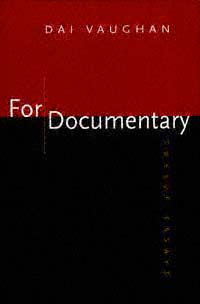 | Title: For documentary: twelve essays Author: Vaughan, Dai Published: University of California Press, 1999 Subjects: Cinema and Performance Arts | Anthropology | Photography | Popular Culture Publisher's Description: These essays, which span twenty-five years of writing and a lifetime of experience, offer fresh and challenging insights into documentary. Dai Vaughan, one of the most highly regarded documentary editors to have worked in Britain in recent decades, makes his starting point plain: "Most of us would feel that the word 'documentary' had not justified its place in the dictionary if the films so called did not manifest some relationship with the world not shared by others." That elusive relationship is the subject of his eloquent reflections and analyses.As critic, Vaughan contrasts the Olympic Games films of Riefenstahl (1936) and Ichikawa (1964); as participant, he tells how the introduction of portable 16mm equipment gave rise to cinéma vérité and observational visual anthropology. The twin perspective of analyst and practitioner results in a radical restatement of the documentary project, one in which documentary is seen as engaging the viewer's freedom in a way that fiction does not. A chapter near the end, "From Today, Cinema Is Dead," is uncompromising in its pessimistic view that digitalization threatens the privileged relationship we have always granted between a photograph and its object. Film theorists and filmmakers, indeed everyone who cares about how our society represents itself to itself, will find For Documentary engrossing as well as illuminating. [brief] Similar Items |
| 92. | 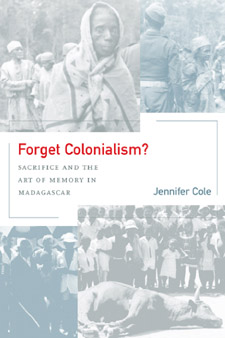 | Title: Forget colonialism?: sacrifice and the art of memory in Madagascar Author: Cole, Jennifer 1966- Published: University of California Press, 2001 Subjects: Anthropology | African Studies | Geography | African History | Cultural Anthropology | Postcolonial Studies Publisher's Description: While doing fieldwork in a village in east Madagascar that had suffered both heavy settler colonialism and a bloody anticolonial rebellion, Jennifer Cole found herself confronted by a puzzle. People in the area had lived through almost a century of intrusive French colonial rule, but they appeared to have forgotten the colonial period in their daily lives. Then, during democratic elections in 1992-93, the terrifying memories came flooding back. Cole asks, How do once-colonized peoples remember the colonial period? Drawing on a fine-grained ethnography of the social practices of remembering and forgetting in one community, she develops a practice-based approach to social memory. [brief] Similar Items |
| 93. | 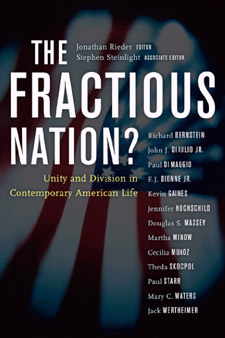 | Title: The fractious nation?: unity and division in contemporary American life Author: Rieder, Jonathan Published: University of California Press, 2003 Subjects: American Studies | Anthropology | Ethnic Studies | Politics | Religion | Sociology | Immigration Publisher's Description: What are we to make of the speed with which the new climate of national solidarity emerged after September 11? Does it not look strange against a backdrop of the much-touted divisiveness of American life? In truth, The Fractious Nation? makes clear, the contrast of the time of divisiveness before and the time of unity that followed is much too stark, indeed. Less than a year before two planes slammed into the World Trade Center, the 2000 presidential election produced not just the starkly blue and red electoral map but also the two tribal Americas those totemic colors emblazoned. And from the cultural wars to immigration restriction, from the Christian right to political correctness, recent decades have witnessed much hand-wringing on the left and the right about the fragmentation of American life. The Fractious Nation? enlists the critical intelligence of fourteen distinguished contributors who illuminate the schisms in American life and the often volatile debates they have inspired in the realms of culture, ethnic and racial pluralism, and political life. The collective wisdom of The Fractious Nation? suggests a counterview to all the overheated rhetoric. The authors warn against fixating on flamboyant incidents of racial conflict when black-and-white values overlap considerably. On a range of cultural issues, the gap between our citizens has closed as well. And even as the rivalry between liberalism and conservatism transmutes into new forms, the political center remains vital and democratic. We are tied together not just by shared values but by institutions - the Constitution, the culture of consumption, the etiquette of ethnic respect. In private life and public affairs, our nation has expanded the meaning of democratic citizenship. Still, there's no room for self-congratulations here. Tendencies toward preoccupation with private life encourage indifference to the suffering of the less privileged. This is also one of the main failings of the narrative of fragmentation: In its focus on matters of shared values, it too distracts from issues of poverty and inequality that also fragment the human spirit. [brief] Similar Items |
| 94. | 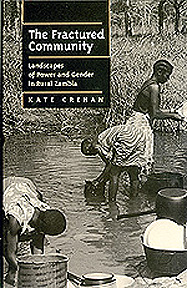 | Title: The fractured community: landscapes of power and gender in rural Zambia Author: Crehan, Kate A. F Published: University of California Press, 1997 Subjects: Anthropology | African Studies | Gender Studies Publisher's Description: This study examines the lives of the women and men living in two small rural communities in Zambia on the eve of the collapse of the one-party state in the 1980s. Moving beyond the limits of traditional ethnography, Kate Crehan traces the often complex ways in which local, day-to-day realities are linked to wider economic, political, imaginative structures of power beyond northwestern Zambia.Drawing on extensive fieldwork, Crehan examines economics and gender, politics and kin relations, state and local relations, and witchcraft. Situating her data within a sophisticated yet accessible theoretical framework, she uncovers the power relations that have shaped and defined these communities. Among Crehan's theoretical contributions is a deft argument for the use of Antonio Gramsci's notion of hegemony to analyze ordinary life.This examination of a marginalized, rural society throws unexpected light on some of the concrete realities of capitalism in contemporary sub-Saharan Africa. It also provides inspiring examples of how complicated theoretical viewpoints can be translated - without simplification - into clear starting points for research. [brief] Similar Items |
| 95. | 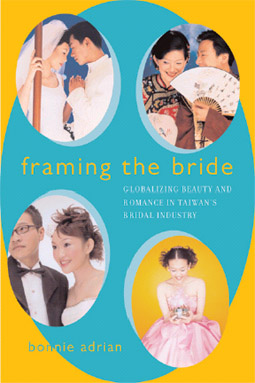 | Title: Framing the bride: globalizing beauty and romance in Taiwan's bridal industry Author: Adrian, Bonnie 1970- Published: University of California Press, 2003 Subjects: Asian Studies | Cultural Anthropology | East Asia Other | Gender Studies | Anthropology Publisher's Description: With a wedding impending, the Taiwanese bride-to-be turns to bridal photographers, makeup artists, and hair stylists to transform her image beyond recognition. They give her fairer skin, eyes like a Western baby doll, and gowns inspired by sources from Victorian England to MTV. An absorbing consideration of contemporary bridal practices in Taiwan, Framing the Bride shows how the lavish photographs represent more than mere conspicuous consumption. They are artifacts infused with cultural meaning and emotional significance, products of the gender- and generation-based conflicts in Taiwan's hybrid system of modern matrimony. From the bridal photographs, the book opens out into broader issues such as courtship, marriage, kinship, globalization, and the meaning of the "West" and "Western" cultural images of beauty. Bonnie Adrian argues that in compiling enormous bridal albums full of photographs of brides and grooms in varieties of finery, posed in different places, and exuding romance, Taiwanese brides engage in a new rite of passage - one that challenges the terms of marriage set out in conventional wedding rites. In Framing the Bride, we see how this practice is also a creative response to U.S. domination of transnational visual imagery - how bridal photographers and their subjects take the project of globalization into their own hands, defining its terms for their lives even as they expose the emptiness of its images. [brief] Similar Items |
| 96. | 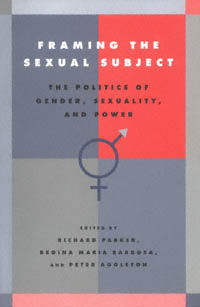 | Title: Framing the sexual subject: the politics of gender, sexuality, and power Author: Parker, Richard G. (Richard Guy) 1956- Published: University of California Press, 2000 Subjects: Anthropology | Cultural Anthropology | Gender Studies | Public Policy | Sociology Publisher's Description: This collection brings together the work of writers from a range of disciplines and cultural traditions to explore the social and political dimensions of sexuality and sexual experience. The contributors reconfigure existing notions of gender and sexuality, linking them to deeper understandings of power, resistance, and emancipation around the globe. They map areas that are currently at the cutting edge of social science writing on sexuality, as well as the complex interface between theory and practice. Framing the Sexual Subject highlights the extent to which populations and communities that once were the object of scientific scrutiny have increasingly demanded the right to speak on their own behalf, as subjects of their own sexualities and agents of their own sexual histories. [brief] Similar Items |
| 97. | 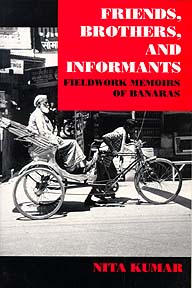 | Title: Friends, brothers, and informants: fieldwork memoirs of Banaras Author: Kumar, Nita 1951- Published: University of California Press, 1992 Subjects: Anthropology | Cultural Anthropology | South Asia Publisher's Description: "Why was Banaras such a mystery to me when I arrived in 1981? Was it ironically because I was an Indian and expected to have a privileged insight into it?"In this unusually personal, evocative account of her fieldwork experiences, Kumar tackles the dilemma of how a Western-trained Indian intellectual adapts to the field and builds deeply affecting relationships with strangers. She discloses what it is like to be a native researching her own culture, offering her fieldwork memoirs in all their spontaneity and candor.We see Banaras through her eyes when she first arrives: throngs of people, cramped and dark lodgings, unappetizing food, mischievous monkeys, and almost overwhelming filth. But as she establishes friendships, we are treated to her discoveries not only about the city and its people, but also about her place in this society.The familiar problems that face most anthropologists conducting fieldwork - of Self versus Other, objectivity versus bias, familiar circumstances versus new and dismaying ones - are given a surprising and complex dimension. Through a narration of her own experiences, the author demonstrates how personal locations - habits, preferences, expectations deriving from childhood memories, and areas of ignorance - impose themselves on the process of selection, observation, and interpretation in research. [brief] Similar Items |
| 98. | 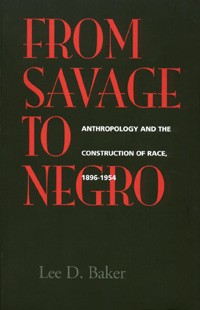 | Title: From savage to Negro: anthropology and the construction of race, 1896-1954 Author: Baker, Lee D 1966- Published: University of California Press, 1998 Subjects: Anthropology | Cultural Anthropology | Ethnic Studies | African American Studies | United States History | Sociology Publisher's Description: Lee D. Baker explores what racial categories mean to the American public and how these meanings are reinforced by anthropology, popular culture, and the law. Focusing on the period between two landmark Supreme Court decisions - Plessy v. Ferguson (the so-called "separate but equal" doctrine established in 1896) and Brown v. Board of Education (the public school desegregation decision of 1954) - Baker shows how racial categories change over time.Baker paints a vivid picture of the relationships between specific African American and white scholars, who orchestrated a paradigm shift within the social sciences from ideas based on Social Darwinism to those based on cultural relativism. He demonstrates that the greatest impact on the way the law codifies racial differences has been made by organizations such as the NAACP, which skillfully appropriated the new social science to exploit the politics of the Cold War. [brief] Similar Items |
| 99. | 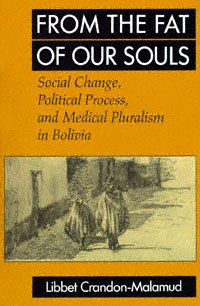 | Title: From the fat of our souls: social change, political process, and medical pluralism in Bolivia Author: Crandon-Malamud, Libbet Published: University of California Press, 1991 Subjects: Anthropology | Latin American Studies | Politics | Medical Anthropology | Medicine Publisher's Description: From the Fat of Our Souls offers a revealing new perspective on medicine, and the reasons for choosing or combining indigenous and cosmopolitan medical systems, in the Andean highlands. Closely observing the dialogue that surrounds medicine and medical care among Indians and Mestizos, Catholics and Protestants, peasants and professionals in the rural town of Kachitu, Libbet Crandon-Malamud finds that medical choice is based not on medical efficacy but on political concerns. Through the primary resource of medicine, people have access to secondary resources, the principal one being social mobility. This investigation of medical pluralism is also a history of class formation and the fluidity of both medical theory and social identity in highland Bolivia, and it is told through the often heartrending, often hilarious stories of the people who live there. [brief] Similar Items |
| 100. | 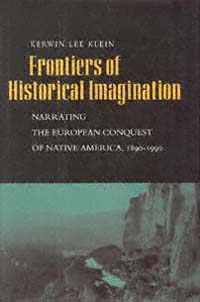 | Title: Frontiers of historical imagination: narrating the European conquest of native America, 1890-1990 Author: Klein, Kerwin Lee 1961- Published: University of California Press, 1997 Subjects: History | California and the West | American Studies | Anthropology | United States History | Intellectual History | Postcolonial Studies Publisher's Description: The American frontier, a potent symbol since Europeans first stepped ashore on North America, serves as the touchstone for Kerwin Klein's analysis of the narrating of history. Klein explores the traditions through which historians, philosophers, anthropologists, and literary critics have understood the story of America's origin and the way those understandings have shaped and been shaped by changing conceptions of history. The American West was once the frontier space where migrating Europe collided with Native America, where the historical civilizations of the Old World met the nonhistorical wilds of the New. It was not only the cultural combat zone where American democracy was forged but also the ragged edge of History itself, where historical and nonhistorical defied and defined each other. Klein maintains that the idea of a collision between people with and without history still dominates public memory. But the collision, he believes, resounds even more powerfully in the historical imagination, which creates conflicts between narration and knowledge and carries them into the language used to describe the American frontier. In Klein's words, "We remain obscurely entangled in philosophies of history we no longer profess, and the very idea of 'America' balances on history's shifting frontiers." [brief] Similar Items |